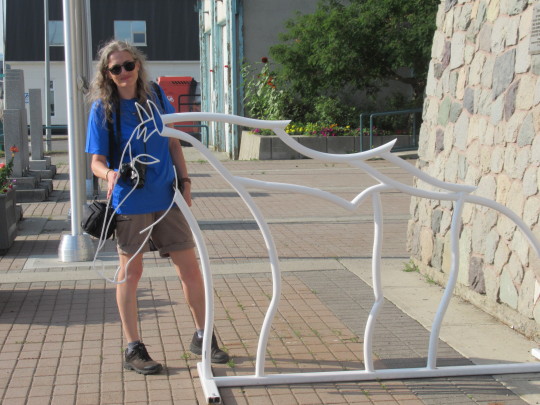#the plights of an online student
Explore tagged Tumblr posts
Text
being hyperfixated on welcome home is so painful because I am frothing at the MOUTH for a friend group that shares my fixation... but also the fandom is so so quiet right now & all the servers on disboard are ones I do not vibe with
#how else am I supposed to find pals!! going outside!?!#the plights of an online student#this is why people bully homeschooled kids#rambles
32 notes
·
View notes
Text
happy pride month, folks! here's some headcanons for the ways the agency trio (+ amanda) relate to the queer community
* farah — did turn to trans-run websites for functional advice, especially on medication (she always double-checks any information she receives, doctors included), and occasionally for surface-level validation (it calms her a bit), but in general never talked to anyone and didn’t even spend too much time reading personal stories. she's been focused on being "normal", on passing well and being stealth, and on achieving her career goals. doesn't like pride parades but not for internalized queerphobia reasons, it's just that they are too loud, too crowded, and make her anxious. it has never ever occurred to her that she can have two lgbt identities and be a lesbian on top of being trans. now she is like a stumbling mentally ill baby deer being led along by all her friends and loved ones.
* todd - knows who he is, experiences neither shame nor pride on the matter, doesn't give much of a fuck. he experimented and screwed around in college, made friends with other lgbt students and musicians, but ultimately was focused more on his music and band than on the queer community (and its issues and plights), even tho these two overlap somewhat (punks are gay, obv). since the amanda fuckening and the loss of his sense of self, he had cut himself off from any possible communities irl and online, including the queer one. currently is slowly making peace with being in love with his best friend. not the kind of guy to know identities outside of "lgbt + nb + ace" and be on top of discourse, is the kind of guy to take enough water and some cereal bars to pride.
* dirk — has a very uneven, sporadic knowledge of all things queer caused by spontaneous falling down wikia rabbitholes. knows what "abrosexual" and "genderflux" means, doesn't know that bears aren't only animals. has a vague idea of who he is (possibly kind of a guy but also not really, pretty sure he likes other guys, not very keen on sex), but changes hyperspecific labels every month because he can't settle.
* amanda — was on tumblr as a teen and young adult, has seen it All, including some pretty unhinged discourse. knows her way around. over the years has progressed to a "you can do whatever you want forever, idgf" worldview, is a chaos queer. genuinely lives by "acab" and "be gay do crimes", believes in abolition of just about everything.
#vikarambles#vika's personal dghda tag#dghda#dirk gently's holistic detective agency (tv 2016)#dghda headcanon#farah black#dirk gently#todd brotzman#(just a dash of brotzly)#amanda brotzman
23 notes
·
View notes
Text





















Day of Bullying Prevention/Blue Shirt Day
Bullying has been a growing problem in schools, especially in past years. While some consider hazing and the abuse that some children take in school to be a typical part of the adolescent experience, rising suicide rates and violence in school has led officials to start taking a hard, zero-tolerance stance on bullying.
If you were picked in school as a kid, or maybe it continued into your college and adult years, World Day Of Bullying Prevention is bringing attention to your plight, and the plight of others who experienced this incredibly difficult, and dangerous, part of many children’s lives.
History of Day Of Bullying Prevention
Bullying has existed probably as long as humans have, but in 2007 two young men by the names of David Shepherd and Travis Price decided that they’d simply had enough. On the first day of school, a day like any other as you may imagine, a student by the name of Jadrien Cota had made a vital error for a young boy starting off a school year. This mistake?
He’d worn a pink shirt. It took almost no time at all for a group of bullies to notice the color of his shirt, and they immediately started giving him a hard time about it. Observing this, David and Travis decided to take a stand. They went home and purchased 50 pink shirts and handed them out at school the next day, encouraging everyone to take a stand against bullying.
It didn’t take long for this practice to catch on and start to spread around the world, in 2008 Gordon Campbell, the Premier of British Columbia, proclaimed a provincial anti-bullying day. It continued to spread until 2012, when the United Nations took this celebration and pushed it one step further, turning it into an Anti-Bullying campaign on a global scale.
How to celebrate Day of Bullying Prevention
Taking a stand against bullying is, in part, an act of vigilance that starts at home. Think about the behaviors you engage in and the light-hearted teasing you do with your co-workers, classmates, and friends. Is it possible that what you see as harmless is in fact being perceived as a damaging and malicious act?
Do you observe bullying going on around you? Stand up and tell the offender to stop and be a champion for the person being bullied. Spread information about what can happen as a result of bullying and be sure to really listen to your kids and friends if they’re complaining about how they’re treated in school. Bullying is a serious problem, and World Day of Bullying Prevention is our opportunity to take a stand against it and stomp it out.
Source
Blue Shirt Day
Blue Shirt Day, also known as World Day of Bullying Prevention, takes place on the first Monday of October each year, being the kickoff to National Bullying Prevention Month. Students, schools, and community members wear blue shirts to highlight bullying prevention, and in solidarity with those who experience bullying in all its forms, such as cyberbullying, cruelty, racism, and homophobia. The color blue was chosen because in many cultures it is seen as bringing calmness and peace, as well as importance and confidence.
How to Observe Blue Shirt Day
Celebrate the day by wearing a blue shirt. Wear your own or order an official one. Besides wearing a blue shirt, you could also wear blue pants, shoes, hats, and more. School administrators and faculty members can register their school for the day, as can community groups and businesses. Students can get more ideas for the day by using the online student participation toolkit.
Source
#USA#Canada#Sonoma#travel#vacation#original photography#landscape#cityscape#summer 2024#first Monday in October#7 October 2024#Day of Bullying Prevention#DayofBullyingPrevention#Blue Shirt Day#BlueShirtDay#tourist attraction#landmark#architecture#Alberta#Northwest Territories#Montana#Nevada#Idaho#Wyoming#California
1 note
·
View note
Text
312,000 rural UK homes and businesses to get access to faster broadband in overhaul of old infrastructure

Hundreds of thousands of rural homes and businesses struggling to fulfil basic online tasks due to outdated broadband infrastructure will receive major internet speed upgrades, as the UK Government fixes the digital divide and powers up all regions of Britain. Up to £800 million in government investment will be made available to modernise broadband infrastructure in rural areas of England, Scotland and Wales, ending the plight of buffering so people can fulfil everyday online tasks, such as streaming films, video calling, or downloading large files, which is currently particularly challenging in some areas of Wales and Scotland. The deal will provide access to lightning-fast gigabit-capable broadband to around 312,000 homes and businesses across Great Britain. It is the first time Wales, the region with the lowest percentage of gigabit coverage, will benefit from this programme. It will mean residents and businesses in remote areas of Britain, such as the South Wales Valleys, Exmoor National Park and the Forest of Bowland will finally gain access to the fastest connection on the market. This will help deliver improved productivity, as part of the government’s mission to kickstart economic growth. The landmark deal with telecoms provider Openreach represents one of the biggest milestones in the rollout of Project Gigabit, which targets places too expensive for providers to reach in their commercial build and which would otherwise be left behind with poor digital infrastructure. It will help meet the growing demand for reliable connectivity, stimulating local rural economies and reducing regional disparities, by enabling remote working and attracting new businesses. The announcement follows this Government’s vow to redouble its efforts to achieve full gigabit coverage by 2030 and harness the enormous potential of technology to grow the economy, accelerate innovation and improve people’s lives. Secretary of State for Science, Innovation and Technology Peter Kyle said: Over the past decade, the UK’s broadband rollout has clearly not happened fast enough and has overlooked too many areas, especially in Scotland and Wales. Robust digital infrastructure is essential for growth, productivity and competitiveness and this shortfall not only poses risks to our economic stability, but also entrenches existing inequalities across the country. We are fixing this by delivering for hundreds of thousands of homes and businesses up and down the country, focusing on the areas that were not prioritised by the previous government, such as Wales. Today marks a significant milestone in delivering on our promise to redouble our efforts to achieve full gigabit coverage by 2030 and lay the foundations for a more inclusive, dynamic and prosperous future for all citizens. Today’s announcement will also improve learning opportunities for students, who will be able to gain better access to online resources and remote learning platforms, as well as healthcare patients, who will be able to further rely on remote consultations – as the UK Government continues its mission to improve public services and grow the economy. Contracts worth £288 million have already been signed with Openreach under the agreement to connect approximately 96,600 homes and businesses in England and, for the first time, Wales. Areas to benefit include Lancashire, North Wiltshire, South Gloucestershire, West and Mid-Surrey, Staffordshire, West Berkshire and Hertfordshire, West and North Devon, and North West, Mid and South East Wales. Talks are now underway with Openreach to agree further contracts to benefit around 215,800 more premises across England, Scotland and Wales, with more announcements expected in the coming months. Areas expected to benefit from these future contracts include Central and North Scotland, North and South West Wales, Mid and South Devon, East and South Shropshire, North Herefordshire, North Somerset, Essex, North East England and Worcestershire. Minister for Digital Infrastructure Chris Bryant said: Far too many rural citizens and businesses are still stuck with outdated internet infrastructure, not being able to fulfil day-to-day tasks as easily as people living in our towns and cities. We have been clear we want to achieve sustained economic growth in every corner of Britain, and this starts by ensuring our communities have the infrastructure they need to thrive. This monumental deal with Openreach will make a real difference to communities – such as staying in touch with loved ones or being able to do business no matter where you are. Project Gigabit will support the government’s plans to kickstart economic growth, creating and supporting thousands of high-paid, high-skilled jobs, empowering industries of all kinds to innovate and increasing productivity by taking up digital technology. It will also ensure people can access vital services they need now and, in the future, from giving patients improved access to healthcare through virtual appointments and remote health monitoring to helping pensioners combat loneliness by catching up with loved ones over higher quality video calls. For households, gigabit-capable broadband delivers faster speeds and fewer dropouts. Unlike traditional copper-based networks, gigabit connections won’t slow down at peak times, meaning no more battling for bandwidth with the neighbours. Gigabit networks can easily handle over a hundred devices all at once with no buffering, meaning the whole family can seamlessly surf, stream and download at the same time. Clive Selley, CEO of Openreach said: Research shows that full fibre provides a host of economic, social and environmental benefits – and I believe we’re the best in the business at delivering it. I’m proud we’ve been chosen, through a fiercely competitive process, and we’re already cracking on with the job. This is a British infrastructure success story. Our network already reaches more than 15 million urban and rural premises and, wherever we build, we bring the widest choice of providers for customers. I’m confident we can reach as many as 30 million homes by the end of the decade if the conditions remain supportive. Trinity House, a charity dedicated to safeguarding lighthouses and maritime navigation aids in England and Wales is set to benefit from this investment. Chief Executive Rear Admiral Iain Lower welcomed the rollout: As an organisation that works in remote parts of the nation, we applaud this rollout by Openreach and Government. This rollout will, among other things, help our operational teams work, connect and live better at our remote lighthouses, an invaluable improvement for when they are away from their homes and families. Looking at the wider benefits, improved working conditions help ensure that our lighthouses work exactly as expected for the tens of thousands of mariners in our waters that rely on our aids to navigation. Safer seas make for a more prosperous island nation, as we depend on merchant shipping to carry 95% of the goods we use daily. Read the full article
0 notes
Text
Dive into New Worlds: Exploring the Best VR Websites
Virtual Reality (VR) has transcended the realm of gaming and is making waves across various industries. From educational tours to artistic experiences, best vr websites are pushing the boundaries of web design and offering a glimpse into the future of the internet.
This article explores some of the most captivating VR websites you can visit to experience the immersive power of VR technology directly from your web browser.
Educational Explorations: Travel the World Without Leaving Your Home
VR websites are revolutionizing education by allowing users to explore historical landmarks, natural wonders, and even the human body in stunning detail. Here are a couple of phenomenal examples:
The Great Barrier Reef by Google Arts & Culture: Dive into the vibrant underwater world of the Great Barrier Reef and come face-to-face with its diverse marine life. This interactive experience allows you to swim alongside colorful fish, explore coral reefs, and learn about the ongoing conservation efforts.
A Journey Through the Human Body by National Geographic: Embark on a microscopic adventure through the human body in this fascinating VR experience. Explore the intricate workings of your organs, systems, and cells, gaining a deeper understanding of your own biology.
These educational VR websites are not just captivating; they can also be powerful learning tools for students of all ages.
Unleash Your Creativity: VR Art Galleries and Interactive Experiences
VR is transforming how we experience art. Several websites are showcasing creative VR experiences that allow you to interact with art in entirely new ways. Here are two standouts:
Google Arts & Culture Exhibits : Google Arts & Culture offers a vast collection of VR exhibits showcasing renowned museums and art galleries from around the world. You can virtually stroll through the halls of the Van Gogh Museum in Amsterdam or explore the ancient artifacts of the British Museum in London, all from the comfort of your home.
The Hallucinatory Space by Marshmallow Laser Feast: This interactive VR experience throws you into a mesmerizing world of light, sound, and movement. Explore abstract landscapes, interact with digital creatures, and lose yourself in a captivating fusion of art and technology.
VR art experiences offer a unique way to appreciate art and can inspire creativity in viewers.
Step into the Game: Interactive VR Experiences
Gaming isn't the only domain for VR experiences. Several websites offer interactive VR experiences that range from educational to purely entertaining. Here are two must-tries:
Google Spotlight Stories: Explore a collection of short, interactive VR stories on various topics. Experience the plight of refugees, witness historical events unfold, or even dance with robots. Google Spotlight Stories offers a diverse range of captivating VR narratives.
Mozilla Hubs: This online platform allows users to create and share 3D virtual spaces. Explore user-created virtual worlds, attend conferences, or even build your own VR world to share with others. Mozilla Hubs fosters a sense of community and opens doors for innovative VR experiences.
These websites showcase the versatility of VR technology and its potential to go beyond entertainment.
While VR headset compatibility can vary, many of these websites offer WebVR experiences, allowing you to experience them directly through your web browser. As VR technology continues to evolve, we can expect even more immersive and interactive experiences to emerge on the web. So, put on your VR headset (if you have one) or simply open your web browser, and get ready to explore the exciting world of VR websites!
1 note
·
View note
Text
A Guide to NCERT Solutions for an Elementary School in a Slum
Introduction to "An Elementary School Classroom in a Slum"
The moving poem "An Elementary School Classroom in a Slum" vividly depicts the harsh reality that kids learning in slums must deal with. The poem criticizes the socioeconomic injustices that impede these kids' academic and personal growth through its lyrics. NCERT solutions are included in this guide to assist students in exploring the themes, images, and messages of the poem.

Understanding the Poem
Themes Exploration: Dive into the central themes of inequality, hope, and the transformative potential of education. Discuss how the poem uses vivid imagery to highlight the gap between the educational experiences of children in slums versus those in more privileged environments.
Imagery and Symbolism: Analyze the use of imagery to depict the classroom's conditions and the lives of the children. Discuss symbols such as the "narrow street sealed in with a lead sky" to understand the poet's portrayal of confinement and lack of opportunity.
Key Questions and Answers
What is the significance of the title?:
Explore how the title sets the stage for a critique of educational inequality and prepares the reader for a journey into the lives of underprivileged children.
How does the poet describe the children in the classroom?:
Discuss descriptions that convey physical and emotional deprivation, yet also hint at the innate potential stifled by their circumstances.
Multiple Choice Questions (MCQs)
The poem primarily critiques which aspect of society?
A) Economic policies
B) Educational inequality
C) Technological advancements
D) Environmental issues
Answer: B) Educational inequality
Which symbol in the poem represents a bleak future?
A) Sun breaking through the window
B) Maps on the classroom walls
C) Slag heap
D) The "lead sky"
Answer: D) The "lead sky"
What does the poet suggest as a solution to the children’s plight?
A) More rigorous academic programs
B) Government intervention
C) An overhaul of the educational system
D) Opening the windows to the outside world
Answer: D) Opening the windows to the outside world
Analyzing Poetic Devices
Metaphor and Simile: Identify and discuss the use of metaphors and similes, such as comparing the classroom to a "slag heap," to convey the grim realities faced by the children.
Alliteration and Assonance: Examine how sound devices contribute to the poem’s mood and tone, enhancing the reader's emotional engagement with the text.
Discussion Points for Classroom Engagement
Role of Education: Debate the poem's portrayal of education as both a failing system and a potential vehicle for change. Encourage students to discuss their views on how education can be made more equitable.
Personal Reflections: Invite students to share their thoughts on how the poem's themes relate to current social issues, fostering empathy and a deeper understanding of inequality.
Utilizing Technology for Enhanced Learning
School Parent Apps: Discuss how these school parent app can be used to share additional resources, homework assignments, and foster discussions outside the classroom about social issues highlighted in the poem.
Digital Platforms for Collaboration: Encourage students to use online forums and platforms to collaborate on projects that explore the themes of the poem, such as creating their own poetry or art inspired by the text.
Conclusion
"An Elementary School Classroom in a Slum MCQ" offers a profound commentary on the disparities in educational opportunities and their impact on children's futures. This NCERT solutions guide aims to provide students with the tools to critically analyze the poem, understand its themes and devices, and reflect on its relevance to contemporary society. By engaging with the poem's content and exploring its messages, students can gain insights into the power of education to transform lives and the importance of striving for equality in all aspects of society.
Check: Preschool in Pimple Saudagar, Preschool in Wagholi, Preschool in Noida
#elementary school#elementary school classroom#elementary school classroom in a slum mcq#elementary school classroom in a slum ncert solutions
0 notes
Text
Weeks in the Womb
Thank you to Unmargin for originally publishing this piece. Bao Phi, love to you for your stewardship.

Weeks in the Womb
By Taiyo Na
Written for our first born child, who was in my partner Sarah’s belly for most of 2020 during the COVID-19 pandemic.
It’s April. 20 weeks in your mother’s womb, when she and her sister take a walk through the neighborhood park, a man calls them “fckin chinks" and spits towards them. Such occasions mark your beginning.
The man’s hatred and delusion doesn’t notice the baby inside her, that there is life on top of life in her body, so if he had a knife or acid to throw like some other lost souls in this city, he would have ripped you open or burned through twice the sanctity of my family. This marks your start.
10 weeks prior in the womb, we share momos and taro buns with Malaya who is visiting from San Jose. We talk Duterte, the plight of the people, Rapsody, D Smoke. We satiate the meal, talk about the 20 years between us. When he leaves, we hug. I clean the plates, notice purple crumbs that smile.
10 weeks prior in the womb, your mother and I weep over the film Queen & Slim. We stand in the lobby of the theater, arms wrapped and sobbing, braced in the heartbreak of a fictional reality we know to be true. This is your first movie.
8 weeks prior in the womb, Annie and Mas have their baby shower for your baby buddy Dash. This is your first party. 9 weeks prior in the womb, my old bandmate Takenori plays his Wes Montgomery fingers over his hollow body guitar at Tomi’s. I know you heard that reverb by the way you dance in the womb. This is your first concert.
Our friend Abe plays drums, delivers lines and belts at the Signature Theatre like we’ve never seen him before, like audiences have never seen before. Cambodian Rock Band, this is your first play.
At a Day of Remembrance at the JA Church, you and your mother love the inarizushi. You come from a long line of people who love inari, across seas through barbed wire fences.
The Lakers went on a run in March, only to be stopped by Brooklyn. We are on the couch. Your father watches the games on the TV while your mother naps. We rest while caressing you over your mother’s belly. These warm hands, your first blanket.
20 weeks in the womb, we are alive during a genocide through federal neglect. Over 10,000 dead, and no sign of the number slowing down. From Queens to Brooklyn, Detroit to Chicago, New Orleans to Newark, there aren’t enough beds, ventilators, masks, gloves, scrubs, care, compassion, generosity to adequately deal with this pandemic.
20 weeks in the womb, those nurses, doctors, grocery store clerks, farmers, delivery folks on the frontlines continue to go to work. Their courage moves us. Your uncle, the baker, lost his job, like millions of other people in this country. He, like all of them, did not deserve this. He's still baking though, making tutorials online. He makes a dough as tender and beautiful as his heart. His bread is waiting for you. Your mother persists, too, holds space for her team. Your father holds space for his students. As best we can in virtual spaces.
20 weeks in the womb, the earth is reshaping itself. We are breathing in an age where there is a shortage of breaths. You take your breaths amidst water, through a cord to your mother, underneath the cocoon of a belly, soft like milk bread.
21 weeks in, your mother starts experiencing Braxton Hicks contractions, brief cramps that are said to prepare her body for your birth. Nature, true to her programming, invites us into signals of what is to come before it is fully present.
The deaths keep ballooning. Public school staff. MTA staff. Folks in prison.
Arundhati Roy once spoke about the era of New Genocide, a byproduct of globalization. New Genocide occurs when human imposed conditions lead to mass death without people actually going out and killing other people. An example would be economic sanctions against Iraq when in ‘97 and ‘98 US sanctions on Iraq claimed more than half a million children's lives. New Genocide is created when there is a purposeful withholding of necessary resources for a population.
You are in the womb during a New Genocide. Its capital is the city of your father’s birth. Your parents’ friends and colleagues are losing their fathers, mothers, friends, grandparents. These are swift, pummeling deaths. Cleaved lungs and vocal cords, like Eric Garner, say their names: they can’t breathe.
By the end of May, we know the names of George Floyd, Breonna Taylor, Ahmaud Arbery and more. Something cracks open. The streets flood with protestors. Statues fall, statements and more statements fly. Former students lead the way while we quarantine with your mother. A tipping point, a rebellion and reckoning in response to double pandemics. Black/American Spring. This birthed here right before you.
30 weeks in the womb, your mother and I decide a name for you: Jayu. In Korean, it means freedom. Free. Both noun and adjective. You are jayu, can be jayu, feel jayu. May you know what this year means, this moment, and may it be in our mother's tongues.
At 36 weeks, we welcome a monstera deliciosa to add to our plant family. The “swiss cheese" plant grows holes in her adult leaves so light cascades to the smaller leaves below. What holes will we grow to let love shine through to our young? What do we let go to give space for?
Week 41. Contractions accelerate. Muscles tighten and release in the rhythm of a storm. Divinely dangerous, the labor which begets all labor, the work that precedes all work. Rings of fire.
Week 41, you're here. Jayu is late, is on time. Wednesday, August 26th. The Milwaukee Bucks, an NBA team goes on strike, the first time for any professional sports team to do so. The Sunday before, Wisconsin police hail seven bullets and paralyze a 29 year old Black father Jacob Blake in front of his children. At a protest in Kenosha, two protestors are shot to death. Other major sports athletes also act in solidarity with the Bucks. It's four years to the day when Kaepernick first kneels in a game. Freedom contracts. Freedom cascades.
When you first slide out of your mother’s womb, you take a moment and realize you’re no longer in a world of amniotic fluid. You wail. Skin to skin with us soothes you. Your mother can’t believe how small you are--a miniature nose, feet, hands. To think we were all that tiny once, small bundles turning into tall things.
0 notes
Text
re: the tags. I would like to take this opportunity to say you very much DO have to self-examine if you find Nazis rallying with you. "Nazis do this a lot" is not a defense in of itself. The radical feminism movement has done this examination, and found that we can differentiate ourselves firmly. We do our due diligence by consistently distancing ourselves from conservative elements, soundly denouncing them, and clarifying our positions and making it obvious that we do not share the alt right cause. We don't give them money, platforms, or validity.
Radical feminist self-policing is constant and rigorous. Enoughso that many lampoon this space's suspicious, unapprochable nature.
The American 'Free Palestine' movement DOES have an antisemitism problem. They DO chant genocidal slogans uncritically. They DO deny basic science and history to spurn Jewish indigenity. They DO spread myths of Jewish cabals controlling the media and world governments. They DO repeat blood libel, treat Jewish concern for the hostages as evil, attack Jews going about their lives, create hostile, antisemitic environments for Jewish students, from peers all the way up to administration. They DO spread misinformation and disinformation without concern. They DO deny the rape of Jewish women despite video evidence and more. They DO knowingly donate money to disgraced organizations proven to indoctrinate children into antisemitism. They DO react to any whiff of sympathy for the plight of Jews with suspicion.
They DO work AGAINST the interests of the Palestinian people by simply supporting one oppressor over the other. Diaspora Jews ARE being killed internationally.
Do not forget that these people's online actions were visible on October 7th itself, before a whiff of any retaliation. I personally witnessed many radfems immediately react to the mass rape of Jewish women with ghoulish excuses claiming the attack to be reasonable, with scorn for Jews and concern for Palestinian men. I have seen them unironically claim they "have Jewish friends" and then equate Jews to Nazis.
You don't, by ANY stretch of the imagination, HAVE to be antisemitic to be staunchly pro-Palestine. But it is everywhere. Bystanders consistently choose the advantageous political strategy of silence over cleansing the movement.
I hate to break it to you, but this is a statement about the hypocrisy of refusing to hold themselves to the same reasonable standards everyone else does, not a "no u" bullshit whataboutism.
Frankly, this is all part of a larger problem with the fringe American Left where we have formed goodness into an identity rather than an earned trait. The antisemitic faction of the 'free Palestine' movement, the Trans Rights Activists, and others have a similar lack of concern because they have both convinced themselves of truly supreme, unquestionable, unassailable goodness, where self-questioning is seen as a weakness.

JKR unfathomably based yet again
834 notes
·
View notes
Text
Mastering Last Minute Submissions with Online tutoring site in India
It is undisputed that homework plays a significant role in the student's academic journey. Many factors highlight its vital importance in helping students develop academically. However, it's also no secret that students frequently dislike homework because it can interrupt their time off. Regardless of the effort they put into it, homework remains an unavoidable fact. Unfortunately, students often aren't motivated enough to tackle their homework, leading to the final realization of unfinished assignments. Online tutoring sites in India offer a set of hacks for homework that will assist you with those last-minute deadlines.
What can online homework help hacks assist me?
Online homework help hacks can be used as useful methods to aid learners in completing their tasks quickly, particularly when time is short. The habit of not completing homework can result in a huge amount of anxiety and anxiety when you have to remember it at the last minute. With the help of effective homework hacks to help you with your homework, you can reduce stress. Hacks like these offer students the ability to manage last-minute assignments.
As you go through the hacks, you might initially see them as routine actions in which you take part. The reason we're creating them is to inspire during times of crisis. In many cases, when confronted with difficult circumstances, we tend to overlook the most straightforward solutions. This collection aims to stimulate your memory by providing the top homework tricks you can count on when facing a last-minute deadline.
Separate it into sections.
If you've ever faced the agonizing task of submitting your homework last minute, You're probably familiar with the fearful brain freeze. When you're in a hurry, you should do everything at once. However, has trying to tackle everything simultaneously ever been successful? Unlikely. Therefore, the best solution is to break down the work into manageable chunks and create clear goals. For instance, if you're confronted with ten problems, consider dividing the questions into five groups of 2. In addition, based on the complexity and duration of the questions, divide the time available into five equal portions. This will ensure that you can devote enough time to each question and lets you monitor your progress over your remaining hours.
Furthermore, the volume of homework assignments can easily overpower even the most disciplined student if you break the homework down into bite-sized chunks or sections to create a manageable work arrangement. The division of work provides the feeling of being in control while dealing with a large amount of work in a short time is sure to create anxiety. So extremely efficient strategies for tackling homework, especially when deadlines are imminent, is to strategically divide your work and assign time efficiently to get the best use of your time and resources.
Eliminate all distractions
If you're under stress, it's normal for restlessness to begin to engulf you. In reality, not having enough time for homework causes stress in a large amount. In addition, being stressed can open the way for many distractions. However, don't worry because we offer a range of homeschool hacks that can also save you from this plight. The trick is to eliminate distractions. Today, we understand this is much more challenging than you think. You need to identify the causes that impede your concentration to eliminate distractions. For students, on average, gadgets such as laptops, mobile phones, and gaming consoles reign as major distractions. For avid readers, books or stories that aren't related to homework can offer a similar appeal.
After you've identified the distractions, please take steps to remove them from your classroom. Of course, you don't want to put away your mobile phone in the trash. But you can put it in a different room or switch it to silent mode to limit distractions. Another method that works is to use distractions as rewards for achieving certain milestones. For instance, you could put your mobile phone in a different room, set a modest objective of completing three tasks in the next ten hours, and take a couple of minutes of distraction as a reward for meeting the goal. This method helps increase concentration because you know that a rewarding reward is in store. Therefore one of the primary homework hacks embraced by numerous students who have to finish their assignments last minute is the removal of all distractions.
You can put Your Core & Essence into It.
As mentioned previously, removing any distractions at the last minute of homework submissions is indisputable. But there's a different homework hack that requires equal focus and commitment. Running against the clock to finish your homework requires unwavering dedication. You need to put your heart and soul into the project, getting it done to accomplish difficult to achieve. If time is limited, there's no room for weak efforts. While this concept may appear familiar, it's only sometimes thought of in reality. In our minds, we think that we're doing all we can when it's the case that we do not meet our goals. So, if you want to be successful in those last-minute submissions, accept them with all your heart and put your all-in effort into them.
Ask for Assistance from Peers
While working on assignments, you might have moments of confusion. Since you're running against time and need help from your educators or teachers might be difficult. In such situations, you can rely on your peers; acquaintances can help as salvation. Contacting them will allow you to seek advice and deal with any issues. Asking for help from friends can also help you avoid appearing uninformed or foolish. Additionally, the benefit of having a support system is that you can reach them at unorthodox hours and not feel awkward. So, one of the most effective methods to improve your grades is establishing the foundation of a supportive network that is essential during times of stress.
However, it's equally crucial to ensure that your colleagues are in a position to finish their tasks. This is a matter of two primary aspects. First, they must have the capacity to help you. Furthermore, their assistance is not a threat to their academic performance. They must be able to meet their assignments' deadlines and lend a hand. This creates a mutually beneficial exchange where both sides can excel academically.
Work Hacks for Homework
In closing, say goodbye to worries about deadline-driven submissions. Utilize these amazing homework tips to complete your work in time for your teacher's deadlines. If you need expert help and an online tutoring site in india can help you in it, look at Eclassopedia.com. Our platform brings together experts of the highest calibre worldwide and will ensure that you receive the most advanced homework assistance.
Article Source: https://medium.com/@eclassopedia22/mastering-last-minute-submissions-with-online-tutoring-site-in-india-521615535e64
0 notes
Text
Ohio School Bus Driver’s Viral Rant Inspires T-shirt, $60K in Donations
— By Lee Brown | April 6, 2023 | New York Post
youtube
An Ohio bus driver who went viral for a foul-mouthed tirade at students has become the inspiration for a T-shirt — as well as a nearly $60,000 fundraiser trying to help her retire.
Jackie Miller told 3News that her rant — in which she threatened to “start kicking some f–kin’ serious ass” because she was “done with the s–t” — followed at least two years of needling by a core group of kids on her Amherst route.
“I’m sorry for the way this went down, I truly am,” the driver said of the rant on a particularly “challenging” day, which she claims happened after a student sprayed perfume and sparked “a horrible asthma attack.”
“I do apologize for my actions on that day. But — I won’t take it back,” she said of the scolding that ended with her resignation.
“This is a plight of all bus drivers. … We are treated with such lack of respect.”
Miller was interviewed by the local outlet at a local clothing store that has created a T-shirt about the episode, donating $5 from all sales of the $25 shirt to the now-jobless driver.
The shirt — in black or green — has a yellow drawing of a school bus along with one of Miller’s catchiest comments on the clip: “My foot’s gonna be so far up your ass it’s going to dangle from your nose.”

Jackie Miller’s rant inspired this shirt, with $5 from each sale being donated to help support her retirement. Bucktee
“We all kind of just felt for her in that moment,” Mistakes on the Lakes store owner Jacqui Adkins of her fundraising shirt.
“Like, we’ve all had bad days, we’ve all gone through hardships and I think our hearts just kind of bled for her,” she said.
The shirt sales will add to an even bigger fundraiser that has already raised more than $59,000 online, with more than 2,500 people donating to help her retire and go on vacation.

Miller says she “apologizes” for her rant but she “Won’t Take It Back.” WKYC
Organizer Jeff Grob decried how school bus drivers are “underpaid and under-appreciated” and how “kids these days are out of control and no one is allowed to reprimand them in fear of losing their job.”
“After so many years of being treated horribly by kids and underpaid, this bus driver was done with it and went Red [Forman] on them,” he said of the notoriously combative character from “That ’70s Show” who also regularly threatened to put his foot in people’s behinds.
“I’m on her side and if it was my kids, make em walk!” wrote Grob.

Miller says bus drivers “are treated with such lack of respect.”
The fundraiser was “to help her pay for some time off and for all the years of loyal dedicated service.”
“We applaud her for tolerating as much as she has and are on her team! Teambusdriver.”
Despite the push to help her retire, Miller told 3News that she hopes to continue driving buses — though likely just for adults.
“There’s just no words to say how grateful that I am for the people who have supported me,” she said. “It restores your faith in humanity. It makes you think that not all people are bad, that there’s really good people in the world.”

0 notes
Text
A crime that the world is keen to forget. But we will not let them.
This horrifying picture, and the many other horrifying images from October 7, stands as the final judgement of Palestinian society. It proves beyond any doubt that Palestinian society is a society of barbarians, drunk on the most despicable and inhuman ideology since the Nazis.
The claim that Palestinian society is oppressed with a desire for social justice is nothing more than the hallucination of Western intellectuals and fraudulent "social justice" activists who refuse to even investigate the ideas of the people they claim to support and know so well.
In reality, these self-deceiving useful idiots were astonished by the scale of Palestinian savagery towards the Israelis on October 7. This left some of the most cowardly, yet principled, intellectuals in a quandary. They knew these crimes deserved the most stringent condemnation.
Yet those around them were celebrating the carnage before the blood had even dried in the streets. If they went with their conscience, they would be excoriated. But they struggled to accept that such evil, from burning children alive to spitting on Shani Louk's half-naked body, could be acceptable.
Many chose therefore to keep their head down and remain silent.
Meanwhile, as further proof of the malign nature of Palestinian society, Jews around the world experienced a wave of hatred and violence even before Israel set foot in Gaza. In Sydney, a largely Arab and/or Muslim crowd shouted, "Gas the Jews!" in response to Sydney opera house lighting up with the Israeli flag to commemorate the victims of October 7.
In London, crowds (again, often Arab and/or Muslim) chased after "Zionists", but soon let slip that they were actually after Jews. In the United States, pro-Palestinian thugs on university campuses created such an atmosphere of intimidation that Jews were afraid to wear visibly Jewish items in public.
(I was working with a university in the United Kingdom around a month after the attacks, and staff were powerless in the face of pro-Palestinian intimidation, which they foolishly believed was just passionate and understandable reactions to the war in Gaza, while acknowledging that Jewish students were too afraid to stay in dormitories.)
The people who love claiming that they are 'fighting racism' did nothing to protect the Jews from this wave of genocidal hatred. They had already made clear that they sided with the Nazi disciples of Hamas, whether by immediately blaming Palestinian crimes against humanity on Israel, by ignoring the plight of Israel's hostages, ignoring or denying widespread evidence of mass rape published by Palestinians themselves online, celebrating the terror attacks as an act of "fighting for freedom", refusing to describe the attacks as terrorism, proudly posting or wearing pictures of Hamas parachutes used to invade Israel, and much more.
Jews on the political left quickly realised that their so-called allies wanted them dead and rejoiced with the murderers. It was a horrifying awakening.
Then we had the pseudo-moralists, who couldn't wait to deflect attention away from Palestinian crimes against humanity and onto Israel's war in Gaza. It wasn't long before they drummed up a campaign of hysteria, slander, and blood libel against the Jewish State for lawful self-defence against terrorists that had publicly promised to repeat October 7 again and again.
It wasn't long before cowardly politicians, though knowing full well that the evidence didn't support the claims of the crowds in the streets, decided to put pressure on Israel to stand down, rather than demanding that Hamas surrender and release hostages. Rather than calling for Hamas' assets to be frozen in order to cripple the terrorist group. Rather than confronting Iran for its funding of terrorism and implementing condign punishments if it continued attacking both Israel and other nations like the U.S. the U.K., and Denmark.
And of course, that beacon of moral confusion, the United Nations, along with with the politicised ICJ, and the ICC, realised they could get away with criminalising Israel's leaders if they could also be seen to punish Hamas terrorists as well. These nations, that were always sluggish when it came to punishing real criminals, like the Russian invaders in Ukraine and the anti-female terrorists of Iran, suddenly moved with alacrity to condemn Israel's fight against Hamas and falsely accuse Israel of endangering the entire civilian population, when Hamas was clearly guilty of this.
As of today, Karim Khan, of the ICC, is still pushing for arrest warrants against Israel's Prime Minister and Defence Minister despite not having heard all the legal arguments in advance and despite a total lack of lawful jurisdiction against Israel, which has a legal system that can investigate alleged war crimes. As of the last few days, legal challengers have provided evidence that Khan's assertions are unfounded, based on information he clearly didn't consider or didn't want to consider before requesting these warrants.
All of this--and more-- is worse than Orwellian. It is, as British journalist Melanie Phillips stated, a combination of Soviet disinformation backed by Nazi propaganda. It is the clearest proof of how hatred of Jews galvanises the Palestinians, the Muslim world, and even the Western world, which claims to have learned from the Holocaust. So we see clearly why the Jews have been singled out for a standard that nobody else is subjected to; why crimes against Jews turn into crimes by Jews; how the anti-Jewish criminals are sanitised as "freedom fighters" and the Israelis dying to defend their land are maligned as purveyors of genocide.
The best response to this shameful betrayal of civilisation is to support Israel's victory against the forces of evil. But those of us who have put our necks on the line to defend Israel should never back down. Never allow the world to forget October 7. Bring it up at every opportunity. Remind them of how Palestinian civilians joined in the carnage, including the burning of Israeli homes with civilians inside, the abuse of hostages brought into Gaza, and the desecration of the bodies of victims, such as the Palestinian men who removed almost all of Shani Louk's clothing and sat on her body, and the Palestinian civilians who cheered and spat on her body as she was paraded through Gaza.
Never let them forget it.
These pro-Palestinian enablers lied to the civilised world. They told us these people just had a valid complaint. They told us the Israelis were brutal and unprincipled.
None of this was true. The Palestinians they were supporting were the brutal and unprincipled ones, the savages whose crimes left Israeli first responders in a state of total shock as they struggled to identify victims' remains and had to prepare bodies as best they could for burial.
It was the Israelis who had the valid complaint: that their right to live in peace in their lawful and ancestral homeland was being attacked by Palestinians intent on murdering the Jews and stealing their land.
October 7 revealed the truth about the Palestinians and the nature of their society.
We will not forget. And we will not let anyone else forget it, either.


#October 7#Hamas Massacre#Israel#11 Months#never forget#justice for israel#justice for october 7#make hamas pay#gaza#palestinian terrorism#palestinian nazism#hamas#palestinian#barbarism#palestinian barbarism#middle east#iran#terrorism#western#politics#always remember#stand with israel
76 notes
·
View notes
Text



















Day of Bullying Prevention/Blue Shirt Day
Bullying has been a growing problem in schools, especially in past years. While some consider hazing and the abuse that some children take in school to be a typical part of the adolescent experience, rising suicide rates and violence in school has led officials to start taking a hard, zero-tolerance stance on bullying.
If you were picked in school as a kid, or maybe it continued into your college and adult years, World Day Of Bullying Prevention is bringing attention to your plight, and the plight of others who experienced this incredibly difficult, and dangerous, part of many children’s lives.
History of Day Of Bullying Prevention
Bullying has existed probably as long as humans have, but in 2007 two young men by the names of David Shepherd and Travis Price decided that they’d simply had enough. On the first day of school, a day like any other as you may imagine, a student by the name of Jadrien Cota had made a vital error for a young boy starting off a school year. This mistake?
He’d worn a pink shirt. It took almost no time at all for a group of bullies to notice the color of his shirt, and they immediately started giving him a hard time about it. Observing this, David and Travis decided to take a stand. They went home and purchased 50 pink shirts and handed them out at school the next day, encouraging everyone to take a stand against bullying.
It didn’t take long for this practice to catch on and start to spread around the world, in 2008 Gordon Campbell, the Premier of British Columbia, proclaimed a provincial anti-bullying day. It continued to spread until 2012, when the United Nations took this celebration and pushed it one step further, turning it into an Anti-Bullying campaign on a global scale.
How to celebrate Day of Bullying Prevention
Taking a stand against bullying is, in part, an act of vigilance that starts at home. Think about the behaviors you engage in and the light-hearted teasing you do with your co-workers, classmates, and friends. Is it possible that what you see as harmless is in fact being perceived as a damaging and malicious act?
Do you observe bullying going on around you? Stand up and tell the offender to stop and be a champion for the person being bullied. Spread information about what can happen as a result of bullying and be sure to really listen to your kids and friends if they’re complaining about how they’re treated in school. Bullying is a serious problem, and World Day of Bullying Prevention is our opportunity to take a stand against it and stomp it out.
Source
Blue Shirt Day
Blue Shirt Day, also known as World Day of Bullying Prevention, takes place on the first Monday of October each year, being the kickoff to National Bullying Prevention Month. Students, schools, and community members wear blue shirts to highlight bullying prevention, and in solidarity with those who experience bullying in all its forms, such as cyberbullying, cruelty, racism, and homophobia. The color blue was chosen because in many cultures it is seen as bringing calmness and peace, as well as importance and confidence.
How to Observe Blue Shirt Day
Celebrate the day by wearing a blue shirt. Wear your own or order an official one. Besides wearing a blue shirt, you could also wear blue pants, shoes, hats, and more. School administrators and faculty members can register their school for the day, as can community groups and businesses. Students can get more ideas for the day by using the online student participation toolkit.
Source
#Napa#Grande Cache#St. Helena#USA#Canada#Beaverlodge#Sonoma#Dawson Creek#Skagway#Carcross#Omak#Whistler#Whitehorse#travel#vacation#original photography#landscape#cityscape#summer 2023#first Monday in October#2 October 2023#Day of Bullying Prevention#DayofBullyingPrevention#Blue Shirt Day#BlueShirtDay
1 note
·
View note
Text
"When I arrived to speak, a boy in the front row was waiting, pencil poised above a ruled notebook. He gazed at me intensely throughout the talk, scribbling furiously away. After I finished, he flipped back to the front page to read out a question that he’d prepared and brought with him. He cited false statistics about rape, claiming men were vastly more likely to be victims, and asking why I chose to ignore their plight. He seemed nervous but excited, confident he had caught me in a lie, with the air of triumphantly unmasking me in front of all his fellow students. He was wearing a red hat emblazoned with words in white: Make America Great Again. Over the next few months, I started to notice something strange. There was always that one boy. Sometimes two or three. They watched intently, eyes shining with excitement. Then they asked the same questions. They gave the same statistics. Often they repeated each other, word for word. Particular themes started cropping up again and again. Why should we listen to you when women lie about rape? Feminism is a man-hating conspiracy designed to let women take over the world when men are the real victims of gender inequality in today’s society. Men are actually more likely to be victims of domestic violence than women. The gender pay gap is a myth.
Eventually, one boy referred to the ‘gynocracy’ and another asked a question in which he directly quoted Milo Yiannopoulos by name. Everything started to fall into place. Instead of just answering boys’ questions and gently providing robust statistics, I started asking them where they’d heard the quotes they were repeating. The answer was always the same: online.
And so hatred of women is ushered into young men’s belief systems without them even realising that that’s what it is. It isn’t hating women; it’s standing up for men. It isn’t hating women; it’s asking for ‘real’ equality. It isn’t hating women; it’s accepting biological difference. It can’t be hating women if everybody is laughing about it online. As messages and conversations like this increasingly cropped up on my radar, it began to seem like there was a gradual rise in the number of young people coming into contact with manosphere ideology. The hostility reported by girls who identify as feminists at UK schools is enormous, with repeated stories of meetings disrupted with misogynistic chants, abusive slogans scrawled over posters, and long-term verbal harassment that has left girls devastated or even forced to change schools. A young woman who identified herself as a feminist in a school discussion I attended emailed me after she was subjected to a campaign of harassment from her male peers as a result. She showed me text messages she had received from boys in her class, whose content read more like a manosphere forum than a teenage text exchange. They informed her that feminism was ‘sexist’, that men are simply biologically superior and that giving them better jobs is just the best way to progress the human race. It’s not their fault, they write; they’re not trying to be ‘mean’, it’s just the way things are. And, reading their messages, I really think they believe it. These are the arguments that teenage girls today – not 100 years ago – are facing from their male peers. Imagine having to try to confront those views among your classmates. Imagine going to school and learning alongside boys who genuinely believe they are simply genetically superior to you.
The boys I meet at schools don’t even know they hate women. They are mild-mannered and wide-eyed. They think it’s only polite to point out the factual inaccuracies and lies repeated by feminists. They have seen misogyny online so often and heard it promoted so persuasively that they wouldn’t even recognise it as a form of hate. The total lack of awareness about this form of radicalisation, and the enormous impact it may be having on some young people, is a missed opportunity to tackle the problem before it spirals out of control."
- Laura Bates, Men who hate women
3K notes
·
View notes
Text
TIFF 2022: Day 5

Films: 5 Best Film Of The Day: Aftersun
The Whale: The hype out of Venice about the lead performance of Brendan Fraser (where he was regaled with a six-minute standing ovation) is absolutely on-point. Playing Charlie, a 600-lb. online English teacher in Darren Aronofsky’s melodrama, set entirely within a dumpy Idaho apartment, he is the anchor, so to speak, of the film’s emotional core.The screenplay, adapted by Samuel D. Hunter from his own play, retains much of the type of uber-emotional bloodletting that tends to play better on the heightened intensity of a live stage than on celluloid (or the digital equivalent). There are monologues laced with a variety of undistilled emotions, wild swings from joyous laughter to unbridled fury, and, as a means of dispensing information, near-direct question and answer sessions, where important details are imparted. There is also Ellie (Sadie Sink), the angry, unbridled 16-year-old daughter of Charlie, who arrives in his apartment for the first time since he left her and her mother for one of his male students eight years before, and comes across as a fierce, white-hot playwright device (“How much will you pay me?” she demands when she first shows up). Fortunately, these melodramatics don’t seem to infect Fraser, who’s performance is so understated and unblemished you care like hell for his character despite the script's verbal contortions. When we first see him, Aronofsky (a diretor not at all averse to putting his characters through the wringer, physically and otherwise) has positioned him in the worst possible light: Sitting on his ratty couch, pleasuring himself to gay porn, and nearly killing himself in the process. Interrupted by a kindly missionary (Ty Simpkins), who wants to win his soul over to the lord, we begin to take in a more complete idea of the character: For all his impossible girth, and despair, he turns out not to be voracious just for the buckets of chicken and meatball subs with extra cheese hand delivered to him by his friend, Liz (Hong Chau), he’s voracious for everything, including literature and other peoples’ stories. He’s an exceedingly kind and compassionate man — to everyone, it would seem, other than himself, whom he punishes with great masses of unhealthy food and pitiless self-hatred — which makes his plight, as the script makes it abundantly clear, a response to the death of his life-partner, who couldn’t deal with his father’s estrangement and starved himself to death. Naturally, over the course of the five weekdays the film is subdivided into, Charlie must rectify his relationship with his estranged daughter, filled with rage and hate towards him, as well as the world at large, and make his own peace before his congenital heart failure finally kills him.
Alice, Darling: A film that feels possibly more like a personal catharsis than an actual narrative feature at times, Mary Nighty’s film start Anna Kendrick — who just gave an interview where she talked about being in a verbally abusive relationship — as a young woman in just such a power dynamic, who needs an intervention from her friends to pull herself out of her emotional death spiral. Kendrick plays the titular Alice, who lives with her successful but neurotically needy artist boyfriend, Simon (Charlie Carrick), whose smug, knowing smile tends to dominate his interactions with other human beings. She reluctantly agrees to go on a girls’ trip with her two best friends, played by Kaniehtiio Horn and Wunmi Mosaku, one of whom a gentle soul, who tries to be respectful of Alice’s life choices, even when they are clearly misguided; and the other, an artist in her own right, albeit unsuccessful, who takes on the more combative role of realist. Lying to Simon about needing to leave for work, Alice takes off with the others to a lake house somewhere out in the Ontario countryside. Naturally, a few days with her friends, and the real Alice begins to resurface (an analogy the film trades in pretty heavily). She stops literally yanking the hair out of her head, and allows for fun drinking to excess again. Of course, Simon, ever-vigilant, eventually glams on to what’s going on, and makes a surprise appearence at the cabin, finally leading to a confrontation in which Alice has to choose between the forces in her life. Trite as it often can be — the women bond, in part, by singing an acapella version of Lisa Loeb’s “Stay” at the top of their lungs — and forced as the giggling comradarie might get between the women, Alanna Francis’s screenplay is dealing with a worthy topic: The ways in which our self-deception can overpower our survival instinct, allowing other forces to dictate our own terms. It’s possible to accept the film’s faults, and instead view it as a sort of plaintive survival cry. It’s too slick to be primal — as solid as Kendrick is, rawness is not something she seems quite able to access — but the sentiment is, as they say, at least well met.
The Eternal Daughter: What are ghosts, but memories? Joanna Hogg’s film, about a ebulient daughter taking her elderly mother to an ancient hotel that she used to go to as a child, seems filled with both. The fog swirls around the place, set deep in dank woods, with gargoyles overlooking the topiary garden. Unsurprisingly, few, if any, other guests are to be found. In fact, the place seems nearly deserted but for a snippy young woman (Carly-Sophia Davies) at the front desk, and a kindly older gentleman (Joseph Mydell), who worked there along with his wife, until she passed away a couple of years before. The two women, mother, and daughter, Julie (both played by Tilda Swinton) spend their time wandering around the dark hallways, or walking their (adorable) pooch, Louis, out on the grounds. At night, as the older woman sleeps, Julie fits about in bed, hearing every creak and moan of the empty rooms above them, and the howling wind whipping about the shutters. There are other bad portents — an elderly woman’s visage, who peers out at Julie each time she approaches the front of the place; her mother seeming to slip further and further away from her, even as she tries to do everything she can in order to give her mother a wonderful experience for her birthday. But the memories her mum has of the place don’t turn out to have been universally positive (she lost a pregnancy there, among other things), and as much as Julie is keen for her mother to bask in her love, there is something that remains ever elusive about her, something she can’t seem to grab hold of, no matter how much of an effort she makes to do so. Hogg washes the film (shot in 35mm!) out in greys and flat tones, adding to the pervasive sense of apprehension, and the dialogue between mother and daughter — consisting of shot/reverse shot sequencing and no two-shot cheats with the formidable actress facing herself directly — turns on the elliptical side. There is, of course, a point to all this subterfuge and apprehension, having to do with memory, and the creation of art, among other things, but it’s largely a film of mood and ambiance, at which Hogg has proven to be almost eerily adept. Like some other films of its ilk — you might be reminded of both The Hound of the Baskervilles and Swimming Pool, among other things — the ending comes at a point you might not have expected, but can still find surprisingly satisfying.
Aftersun: Memory can be famously tricky to represent in film. It’s one of the ways in which the novel, with its ability to engage deeply into a character’s subconscious, would seem to be the preferred medium to capture that particular process. Make it too literal, say a series of frequent back-and-forth flashbacks, and you can end up with wheezy, laborious bore (a la My Policeman, which premiered at this very festival); go the other direction, keeping it ephemeral and esoteric, and you can lose the emotional core in favor of an over-intellectualized exercise. Charlotte Wells’ devastatingly brilliant debut feature is crafted from snippets of memory and metaphor and stitched into an informal collage of grief. Primarily, the film’s narrative is centered on a holiday trip to a Greek resort in the mid-‘90s, taken by a young father, Calum (Paul Mescal), and his 11-year-old daughter, Sophie (Frankie Corio), as partially relayed by the home movies they both shot on Calum’s video recorder. In those, grainy, hand-held shots, the camera swoops around, capturing the loose mood of the pair, as they go about the business of their end-of-summer holiday. There is also the sense of these old tapes being edited as we watch — the images suddenly freezing, as if paused, stuttering forward and back — before we plunge back into the regular scene work that fleshes out their experience. Spending time at the pool, or diving off a boat, having their meals at outdoor tables, wandering around the grounds of the resort, playing pool, and goofing on each other, information about their circumstances comes in small, tiny bits — we learn Calum’s dream of opening a cafe has been deferred; that he’s taken up Tai Chi, and that, despite her mom splitting with him for another woman, he’s still enthusiastic about her happiness, and so on, but in more subtle ways, we begin to grasp the circumstances of this particular trip, why it would stand out to the adult Sophie (Celia Rowlson-Hall) the way it does. We only see her in fleeting glimpses, and mostly in flash-strobed moments in a darkened nightclub, Wells’ (incredibly adept) metaphor for the obscured flashes of memory we get to hang onto in our lives. Wells’ extraordinary film shows just enough without telling us anything directly, an incredibly potent way to register grief and loss, and to display how much we will still never know about the people we love dearest. “You can tell me anything,” Callum says to Sophie at one point, as they sit on a diving platform off a Mediterranean beach, but as we all know, it’s the things remaining inexpressible that will go on to devastate us the most.
The Menu: As if the uber-riche hadn’t been socked to it enough with the palme d’Or winning Triangle of Sadness, director Mark Mylod takes it to them again with his film, about a wildly extravagant dining experience set in a restaurant on its own island, that proves to be the culminating work in a grandly audacious culinary career. As the patrons all gather on the pier, we meet all sorts of social visigoths — a washed-up former movie star (John Leguizamo); the brash, young tech-tycoons (played by Rob Yang, Arturo Castro, and Mark St. Cyr); the snooty food critic (Janet McTeer) and her toadie assistant (Paul Adelstein); the old-money blue-bloods (Reed Birney and Judith Light); and the genuine foodie (Nicholas Hoult), along with his hired female companion (Anya Taylor-Joy) — all there to treat themselves to the audacious dining installations by the incomparable Chef Slowik (Ralph Fiennes). Over the many, many odd courses (including a “breadless bread board,” and a ‘taco night’ installment that features tortillas laser-printed with memories of each of the guests), it slowly becomes clear that the Chef, and his assistant (Hong Chau), have prepared this extraordinary feast as a final act, with the intention of taking all the diners down with him as a final statement on the dining experience. Fans of HBO’s “Succession” might recognize the tableau (Mylod is a veteran director for the show), albeit several steps more ludicrous in Seth Reiss and Will Tracy’s scorning screenplay, but Mylod’s film is even more no holds barred than the scorching TV series. As it becomes gradually more and more clear to the patrons what is happening to them, at least one diner still considers the possibilities — a chance, after all, to have the last such dinner Chef Slowik will evidently ever perform is an elevated experience of such rarity, dying seems more than worth it.
Wherein the author contemplates this year’s offerings and the past decade of covering this fabulous film festival, as he’s poised to embark on a new career path that will more than likely involve him standing up in front of a group of sullen teens, espousing the glories of the Russian masters, rather than taking in a beatific week of international cinema in the early days of September.
#sweet smell of success#piers marchant#ssos#movies#arkansas democrat gazette#film#tiff#toronto international film festival#2022#the whale#darren aronofsky#brendan fraser#the eternal daughter#joanna hogg#tilda swinton#alice#darling#anna kendrick#the menu#ralph fiennes#nicholas hoult#anya taylor joy#mark mylod#afterglow#charlotte wells
43 notes
·
View notes
Text
Staring at the screen of his laptop, the words seemed to blur together. They didn't know what they were supposed to do with themself. It would be easier if they had physical copies and a red pen, but such were the plights of having an online course to teach. If one of these students could form a conclusive argument, perhaps he would have felt a bit better about things. None of them were supported and he wanted to tear his hair out.
He sighed. "I'm an English professor, but you wouldn't think it if you looked at the grammar of half of these essays. I know they're required to take English, but it shouldn't be such a chore. They speak English! It should come easily!" It always had to him anyway.

Having been stood up by his own husband could have felt worse if only Salvador wasn't used to it. A quick text to acknowledge their date was canceled and Sal closed his phone before shrugging it of. It was the con of impredictable professions and Sal didn't mind rescheduling in the slightest, on the contrary, he was proud of his husband for all the work they did. Now, he was a bit hesitant if he should stay and finish his coffee or just go, Sal took a look around and regarded his chair neighbour. From his point of view, the person next to Sal seemed completely desperate and it felt only natural when the conversation began.
"Hm? Well you shouldn't, I'm sure you're great otherwise you wouldn't be questioning yourself about it." Sal offered good naturedly with his decades of well earned wisdom, taking a sip from his own mug of black coffee before crossing his legs and pointing to the laptop with his head. "What do you teach anyways? Looks like entire novels in there."

#∆ what's it feel like to be a ghost? ⊵ ali#∆ quick but not quite painless ⊵ interactions#ali ft salvador
41 notes
·
View notes
Text
"When I arrived to speak, a boy in the front row was waiting, pencil poised above a ruled notebook. He gazed at me intensely throughout the talk, scribbling furiously away. After I finished, he flipped back to the front page to read out a question that he’d prepared and brought with him. He cited false statistics about rape, claiming men were vastly more likely to be victims, and asking why I chose to ignore their plight. He seemed nervous but excited, confident he had caught me in a lie, with the air of triumphantly unmasking me in front of all his fellow students. He was wearing a red hat emblazoned with words in white: Make America Great Again. Over the next few months, I started to notice something strange. There was always that one boy. Sometimes two or three. They watched intently, eyes shining with excitement. Then they asked the same questions. They gave the same statistics. Often they repeated each other, word for word. Particular themes started cropping up again and again. Why should we listen to you when women lie about rape? Feminism is a man-hating conspiracy designed to let women take over the world when men are the real victims of gender inequality in today’s society. Men are actually more likely to be victims of domestic violence than women. The gender pay gap is a myth.
Eventually, one boy referred to the ‘gynocracy’ and another asked a question in which he directly quoted Milo Yiannopoulos by name. Everything started to fall into place. Instead of just answering boys’ questions and gently providing robust statistics, I started asking them where they’d heard the quotes they were repeating. The answer was always the same: online.
And so hatred of women is ushered into young men’s belief systems without them even realising that that’s what it is. It isn’t hating women; it’s standing up for men. It isn’t hating women; it’s asking for ‘real’ equality. It isn’t hating women; it’s accepting biological difference. It can’t be hating women if everybody is laughing about it online. As messages and conversations like this increasingly cropped up on my radar, it began to seem like there was a gradual rise in the number of young people coming into contact with manosphere ideology. The hostility reported by girls who identify as feminists at UK schools is enormous, with repeated stories of meetings disrupted with misogynistic chants, abusive slogans scrawled over posters, and long-term verbal harassment that has left girls devastated or even forced to change schools. A young woman who identified herself as a feminist in a school discussion I attended emailed me after she was subjected to a campaign of harassment from her male peers as a result. She showed me text messages she had received from boys in her class, whose content read more like a manosphere forum than a teenage text exchange. They informed her that feminism was ‘sexist’, that men are simply biologically superior and that giving them better jobs is just the best way to progress the human race. It’s not their fault, they write; they’re not trying to be ‘mean’, it’s just the way things are. And, reading their messages, I really think they believe it. These are the arguments that teenage girls today – not 100 years ago – are facing from their male peers. Imagine having to try to confront those views among your classmates. Imagine going to school and learning alongside boys who genuinely believe they are simply genetically superior to you.
The boys I meet at schools don’t even know they hate women. They are mild-mannered and wide-eyed. They think it’s only polite to point out the factual inaccuracies and lies repeated by feminists. They have seen misogyny online so often and heard it promoted so persuasively that they wouldn’t even recognise it as a form of hate. The total lack of awareness about this form of radicalisation, and the enormous impact it may be having on some young people, is a missed opportunity to tackle the problem before it spirals out of control."
- Laura Bates, Men who hate women
1K notes
·
View notes